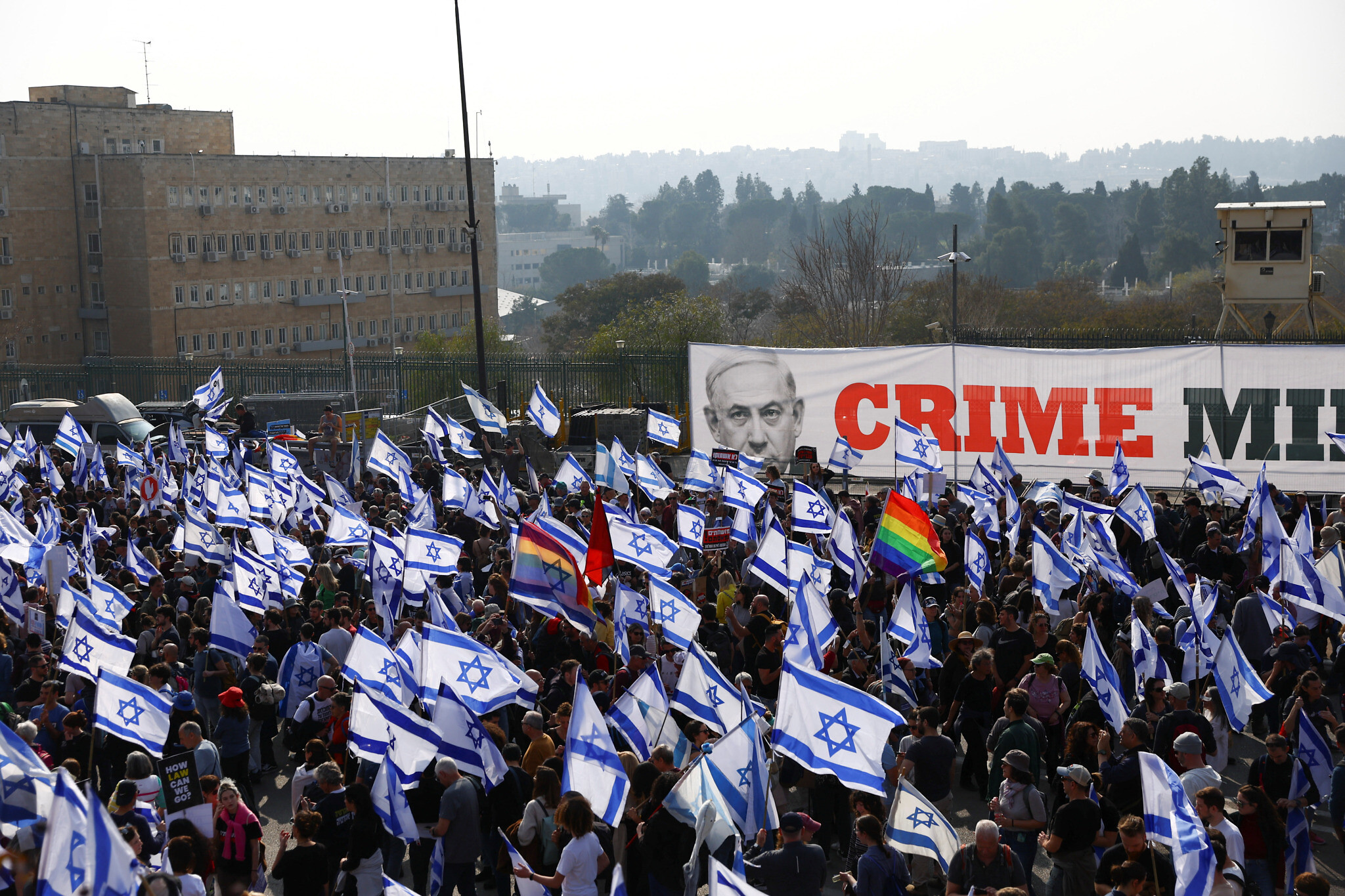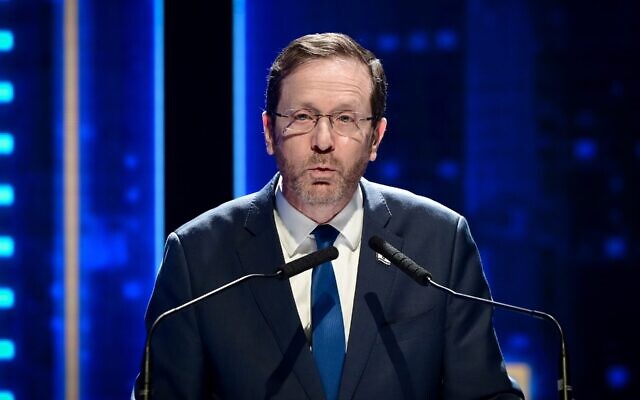Israeli president warns of a looming, bloody ‘real civil war’ amid battle over court reform
“In this moment, of all moments, in the 75th year of the state of Israel, the abyss is within reach,” says Isaac Herzog in primetime televised address to nation
Israeli president Isaac Herzog warned of the possibility of civil war if the governing coalition won’t agree to a compromise on its judicial reform legislation.
The statement is one of the most dire pronouncements by a senior Israeli official about the tumultuous fallout from the judicial proposal, which has sparked fierce debate, months of street protests and civil disobedience. And it is a stunning pronouncement from Herzog, a public figure known for congeniality, who holds a position that has historically been defined by restraint.
“I have heard real, deep hatred,” Herzog said in an address carried on primetime TV. “I have heard people from all sides saying that, God forbid, blood in the streets will not shock them.”
Herzog, whose compromise proposals were already being rejected by the government, said his warning should terrify every Israeli.

“He who thinks that a real civil war, one that costs lives, is a line we won’t reach, is out of touch,” he said. “In this moment, of all moments, in the 75th year of the state of Israel, the abyss is within reach.”
The speech, as chilling as it was, did not appear likely to head off the intensifying unrest. The opposition welcomed Herzog’s proposed compromise, while government figures rejected it.
Israel has been rocked by weeks of protests against the reforms proposed by Israeli Prime Minister Benjamin Netanyahu’s government, which would sap the Supreme Court of much of its power and independence. More recently, the national security minister, Itamar Ben-Gvir — who has professed admiration for Meir Kahane, a rabbi barred from Israel’s parliament in the 1980’s because of his racism — has ordered police crackdowns on protesters.
The speech was extraordinary in part because the role of president is mostly ceremonial. The president, in recent years, has been seen as a conciliator in Israel’s fractious society.
Additionally, Herzog, a former leader of the Israeli Labor Party and chairman of the Jewish Agency, is seen as a compromiser. In 2021, when the Israeli parliament, the Knesset, elected him in a secret ballot, he won a larger majority than any of his predecessors, drawing support from the left and the right.
The legislation advanced by Netanyahu’s coalition would allow a simple majority of the Knesset to override Supreme Court decisions, and would give the coalition complete control over the selection of the court’s judges.
The Supreme Court has repeatedly defended the rights of vulnerable populations in Israel, including Arab Israelis, LGBTQ people, non-Orthodox Jews and women. Netanyahu’s supporters say the proposed changes put necessary brakes on an activist judiciary while empowering the country’s right-wing majority, while critics at home and abroad — including President Joe Biden, top Democrats in Congress and portions of the Jewish organisational establishment in the United States — say they threaten Israel’s democracy.
With his speech, Herzog unveiled a proposed compromise, which would balance judicial and political interests in selecting judges. Proponents of reform say the system now allows judges too much power in choosing their replacements, and want to give the upper hand to the governing coalition.
Herzog’s compromises also include advancing a law that would make it harder to pass the “basic laws” that comprise Israel’s constitution. Basic laws currently require a bare majority of 61 of 120 members to pass. Herzog’s proposal would preserve the 61-vote threshold for each of the first three votes, but would also add a fourth and final reading requiring a two-thirds majority of 80 Knesset members.
His compromise would also reduce the power of the Supreme Court to review laws the Knesset passes, but would not go as far as Netanyahu’s proposals to gut judicial review. Under Herzog’s system, for instance, the court would not review basic laws, which would require more votes to pass. Herzog also proposed a basic law to protect the rights of vulnerable populations.
Government figures immediately rejected Herzog’s proposal. “It’s worse than the current situation,” said Shlomo Karhi, the communications minister, on Twitter. “We can’t accept it.” Opposition leaders, meanwhile, welcomed the proposal and said it could serve as a basis for a negotiated compromise.

Thank you for helping to make Jewish News the leading source of news and opinion for the UK Jewish community. Today we're asking for your invaluable help to continue putting our community first in everything we do.
For as little as £5 a month you can help sustain the vital work we do in celebrating and standing up for Jewish life in Britain.
Jewish News holds our community together and keeps us connected. Like a synagogue, it’s where people turn to feel part of something bigger. It also proudly shows the rest of Britain the vibrancy and rich culture of modern Jewish life.
You can make a quick and easy one-off or monthly contribution of £5, £10, £20 or any other sum you’re comfortable with.
100% of your donation will help us continue celebrating our community, in all its dynamic diversity...
Engaging
Being a community platform means so much more than producing a newspaper and website. One of our proudest roles is media partnering with our invaluable charities to amplify the outstanding work they do to help us all.
Celebrating
There’s no shortage of oys in the world but Jewish News takes every opportunity to celebrate the joys too, through projects like Night of Heroes, 40 Under 40 and other compelling countdowns that make the community kvell with pride.
Pioneering
In the first collaboration between media outlets from different faiths, Jewish News worked with British Muslim TV and Church Times to produce a list of young activists leading the way on interfaith understanding.
Campaigning
Royal Mail issued a stamp honouring Holocaust hero Sir Nicholas Winton after a Jewish News campaign attracted more than 100,000 backers. Jewish Newsalso produces special editions of the paper highlighting pressing issues including mental health and Holocaust remembrance.
Easy access
In an age when news is readily accessible, Jewish News provides high-quality content free online and offline, removing any financial barriers to connecting people.
Voice of our community to wider society
The Jewish News team regularly appears on TV, radio and on the pages of the national press to comment on stories about the Jewish community. Easy access to the paper on the streets of London also means Jewish News provides an invaluable window into the community for the country at large.
We hope you agree all this is worth preserving.






















